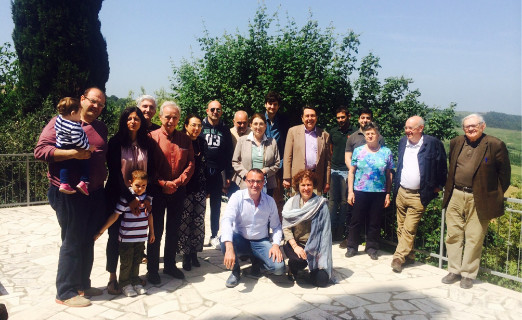What We Do
The Institute implements and promotes research, training and awareness in order to publicize and foster the economic, social and political culture inspired by the work of Eugenio Colorni and Albert O. Hirschman, thereby deepening and disseminating their contributions to the development and emancipation of women and men through an international and multidisciplinary approach.

Building and animating
Building and animating, with a democratic federalist approach, an international network of people who are inspired by the thought of E. Colorni and A. O. Hirschman, and who adopt the analogous operational methods in order to achieve integration of knowledge, skills and experiences, fostering engagement, dialogue and cooperation among the various parts of the world. Interactions among the members of this network will comprise shared projects, meetings, cultural comparisons, and other relevant interventions geared towards the same end.

Support concrete applications
Supporting concrete applications of these concepts through the validation of various experiences (cultural, economic, political etc.) that have been inspired by these ideals, and the articulation of associated know-how that they have repeatedly exercised.

Building multi-level networks
Building multi-level networks of private, public and public-private experiences that are inspired by the Colorni-Hirschman perspective, and integrating their processes based on the principles of democracy, development and social justice.

Organizing the intellectual output
Organizing the intellectual output and applications inspired by Luca Meldolesi, and employing in every sphere a well-known Colornian stratagem: the method of affection through which an intelligent generosity will develop. In fact, this method teaches individual giving and collective receiving.

Safeguarding the existing trove of documents
Safeguarding the existing trove of documents, disseminating the results of research and interventions within the scientific community, creating opportunities for training and constituting a point of reference for the international network.

Fostering creativity and originality
Fostering creativity and originality in the theoretical and practical undertakings of the new generation through scholarships and mentorship, linking them with this perspective.
In the pursuit of these goals, the initiatives launched and promoted by the Institute are inspired by freedom, social justice, economic development, democracy and federalism, with a special focus on the ‘South’ of Italy.
In particular, the Institute promotes the following activities:
- Research in the social sciences, with special attention to Hirschman’s tradition of ‘trespassing’;
- Support and development of economic and cultural initiatives;
- Provision of scholarships and research awards;
- Training (managed both directly and indirectly);
Expert technical assistance on national and international scales in the following areas:
- Development, modernization and social justice;
- Entrepreneurship and business development;
- Democratic processes in civil society and in local and national administration;
- International cultural and economic networks, both public and private.
2018
- Organizing the Second Conference on Hirschman’s Legacy: A bias for hope held at World; Bank, Washington, DC, on October 25–26, 2018;
- Publication of the e-book Beautiful Pages by Judith Tendler, edited by Nicoletta Stame, October 21, 2018;
- Organizing the event Rhythm&Light-Montepulciano meets the Harvard Art Museums held in Montepulciano (Italy), on September 14, 2018;
- Organizing the thematic meeting Challenges of reform and innovation in the Public Administration held in Rome (Italy), on July 9, 2018;
- Organizing the First Italian Conference on Hirschman’s Legacy held in Naples (Italy), on April 9, 2018;
- Publication of the book L'ultimo anno 1943-44, Genesi di una prospettiva (The last year 1943-44, Genesis of a perspective), edited by Luca Meldolesi, June, 2018;
- Publication of the book I dialoghi di Ventotene (Ventotene's dialogues), edited by Luca Meldolesi, January, 2018;
2016
- Preparing the second issue of “Long is the journey” on this website;
- Launching of the book series “A Colorni-Hirschman International Institute” by the Rubbettino Publishing House. First books published: Eugenio Colorni: Microfondamenta. Passi scelti dall’epistolario (Micro-foundations. Selected pages from the epistolary), ed. by Luca Meldolesi, 2016;
- Eugenio Colorni: La scoperta del possibile. Scritti politici(The discovery of the possible. Political writings), ed. by Luca Meldolesi, 2016;
- Meeting the mini-prizes recipients for their continuing development and empowerment;
- Participating in the Entrepreneurship Schools of Portici and Giugliano (Campania Region);
- Participating in the Conference Cycle “Passi Avanti, passi da fare” (Steps forward, steps needed) at Ambrosianeum, Milan;
- Co-organizing the seminar “Italiani svegliamoci e rammendiamo il mondo” (Italians, let’s wake up and mend the world), Naples, February 16;
- Organizing the first “Scuola colorniana” (Colorni school), Montepulciano, March 18-20;
- Participating in the seminar “Gestione imprenditoriale dei beni confiscate alla mafia” (Entrepreneurial management of the goods confiscated from mafia), Casal di Principe (Campania Region), November 4.
2019
- Organizing the Third Conference on Hirschman’s Legacy: A Passion for the Possible; Berlin School of Economics and Law, Berlin, on October 24–25, 2019;
- Publication of the Second of Five Books by Eugenio Colorni: The discovery of the possible, Bordighera Press, October, 2019;
- Publication of the book Il Mezzogiorno della Speranza, Italia Vulcanica n.3, edited by Luca Meldolesi, October, 2019;
- Publication of the book Cambiamento: che passione!, Tacciuno italiano n.2, edited by Luca Meldolesi, October, 2019;
- Publication of the book L'Alta Marea, cronache dell'Italia Vulcanica, edited by Luca Meldolesi, September, 2019;
- Publication of the e-book A Bias for Hope, edited by Luca Meldolesi and Nicoletta Stame, May, 2019;
- Organizing the Second Italian Conference on Hirschman’s Legacy held in Naples (Italy), on May 10-11, 2019;
- Publication of the First of Five Books by Eugenio Colorni: Critical thinking in action, Bordighera Press, March, 2019;
- Publication of the book Italia Vulcanica: qui comincia l'avventura ... , edited by Luca Meldolesi, February, 2019;
- Publication of the book Taccuino Italiano 1, edited by Luca Meldolesi, February, 2019;
2017
- Preparing the third issue of “Long is the Journey” for this websit;
- Organizing the First conference on “Hirschman’s Legacy: theory and practice”, to be held at Boston University on October 6-7, 2017;
- In the book series “A Colorni-Hirschman International Institute” by Rubbettino Publishing House: Luca Meldolesi: Alla scoperta del possibile. Il mondo sorprendente di Albert Hirschman (Discovering the Possible. The Surprising World of Albert Hirschman), II edition, 2017;
- Eugenio Colorni: Critical Thinking in Action, ed. by Luca Meldolesi and Nicoletta Stame, 2017;
- Organizing the Second “Scuola colorniana” (Colorni School), Rome, January 20;
- Organizing the seminar “Ricordando Judith Tendler” (Remembering Judith Tendler), Rome, February 14;
- Co-organizing the seminar “Sud, Amministrazione, Sviluppo” (South, Administration, Development) with the Regional Council of Campania, Naples, February 20;
- Organizing the seminar “Attualita’ della lezione cattaneana e le aree metropolitane di Napoli e Milano” (Actuality of Cattaneo’s lessons and the metropolitan areas of Naples and Milan), Naples, March 6;
- Co-organizing the seminar “Il percorso politico di Eugenio Colorni” (The political journey of Eugenio Colorni), Rome, May 19;
- Participating at seminars by ISVI (Institute for Entrepreneurial Values), Milan, June.
2015
In the first year of its activity, AC-HII has concentrated its efforts on:
- A meeting of the Board of the Institute with operatives and leaders of two generations in Montepulciano di Siena (May 15–17, 2015);
- Financing two full scholarships and one partial scholarship to the Global Village of Future Leaders (Lehigh University, PE), a Summer Business School started by Lee Iacocca;
- Connecting friends all over the world and launching this website;
- Developing cultural work and initiatives according to the point of view espressed under “Our Classics” and in “Long is the Journey”;
- Upgrading and enhancing practical work in various Italian regions, with special reference to the Italian South;
- Awarding mini-prizes for young intellectuals.

Montepulciano di Siena (May 15–17, 2015)
2019
read more
2018
read more
2017
read more
2016
read more
2015
read more
Among the first experiences shared by many participants in the network of A Colorni-Hirschman International Institute were the activities surrounding the teaching of Economic Policy by Luca Meldolesi at the University of Naples in the ’80s and ’90s of last century. These activities were reported in a xeroxed publication called “Bollettino degli Improbabili” (The Improbables Newsletter).
The name “improbables” resonates with Hirschman’s possibilism: “He who looks for large-scale social change must be possessed, with Kierkegaard, by ‘the passion for what is possible’ rather than rely on what has been certified as probable by factor analysis” . While traditional thinking pushes for searching models and regularities, and making hypotheses about what is probable (which, however, is not certain, and could just be a repetition of something existing but not satisfying) whoever is looking for change must detect potentialities that exist even where not expected.
Hence, the “improbables” are those who, moving in the interval between the probable and the possible, offer an individual and collective contribution out of the box.
In subsequent years, with new experiences in public administration, firms, social cooperation, research and political activity many more “improbables” have gathered around that original group.
The Improbables 2019
Ciro Accetta – Manager of Public Companies, Napoli
Alessandro Alaimo – Coordinatore Assistenza tecnica e gestionale del FSE nazionale, Roma
Paola Alfano – Entrepreneur, Napoli
Rosaria Amantea – Architect
Angela Arbitrio – Sector manager, Sviluppo Basilicata, Potenza
Aniello Ascolese – Private Teacher, Pagani (NA)
Valeria Aniello – Policy and programme evaluator, Presidency of the Italian Council of Ministers, Roma and Napoli
Maria Ariano – World Bank, Washington (USA)
Maria Rosaria Aurisicchio – Entrepreneur, Benevento
Liliana Bàculo – University professor, Napoli
Alessandro Balducci – University Professor, Milano.
Vito Belladonna – Training and evaluation consultant, Bari
Tito Bianchi – Policy and programme evaluator, Presidency of the Italian Council of Ministers, Roma
Francesca Brancaccio – Entrepreneur, Napoli
Rita Brighel – Entrepreneur, Napoli
Antonio Bruno – Entrepreneur, Grottaminarda (AV) and Piacenza
Rosaria Bruno – Doctor, Grottaminarda (AV)
Renato Bruno – Entrepreneur
Filippo Bucarelli – Entrepreneur, Roma
Elvira Celardi – Phd Scholar Sapienza University Roma, Roma
Daniela Caianiello – Public Finance general manager, Comune di Pozzuoli (NA)
Nicola Campoli – Public official, Unione Industriali, Napoli
Antimo Caputo – Entrepreneur, president Confidi, Napoli
Nicola Caputo – Entrepreneur and Regional Councilor Regiona Campania, Teverola (CE)
Paolo Caputo – Entrepreneur and business Consultant, Napoli
Danielle Carrabino – Curator of Museum, Northampton MA (USA)
Alberto Carzaniga – Manager and Undersecretary of State, Milano
Roberto Celentano – Researcher, Napoli
Serafino Celano – Economy Consultant, Avellino and Roma
Silvia Celli – Teacher
Marco Chiauzzi – Public Finance General Manager
Brunella Chiodo – Company manager, Lamezia Terme (CZ)
Giuliano Ciano – Social Entrepreneur, Napoli
Antonella Ciaramella – Member of Regional Council, Regione Campania
Francesco Cicione – Entrepreneur, Entopan, Catanzaro
Franco Saverio Cioffi – Temporary manager and business consultant, Bagnoli (NA)
Vittorio Coda – University Professor, Bocconi, Milano
Stefano Colombu – Software programmer, Singapore
Emanuela Costa – Medical Manager, Roma
Alberto Cozzo – Maritime Lawyer, Catania
Giusi Crimi – Manager, Entopan, Catanzaro
Alberto Criscuolo – World Bank, Washington (USA)
Martina D'Amico – Training Consultant, Catania.
Enzo de Bernardo – Director, Federsolidarietà. Roma
Giusi De Capua Cioffi – Consultant
Anna De Caro – European Commission Collaborator for Youth Programs, Cetraro (CS)
Giovanna del Gaudio – Researcher and Entrepreneur
Francesco Greco – Administrative and Accounting Expert, Catania
Mariabrigida Del Monaco – Sector Manager, Sviluppo Campania, Caserta
Ciro Esposito
Niccolò D'Aquino – Journalist, Roma and New York
Massimo d’Esposito – Entrepreneur, Napoli
Gennaro di Cello – Manager and social entrepreneur, Entopan, Catanzaro
Amedeo Di Marco – Industrial consultant, Cava dei Tirreni (SA)
Tommaso di Nardo – Research Department Manager of Ordine Commercialisti, Villaricca (NA) and Roma
Paolo Di Nola – Director Invitalia, Gragnano (NA) and Roma
Leonida Di Salvo – Lawyer, Giugliano in Campania (NA)
Paolo di Virgilio – Manager of Campania Region, Napoli
Viviana Fini – Psychologist, Roma and Massa C
Osvaldo Feinstein – University Professor, Madrid
Caterina Farao – Researcher, Giussago (PV)
Alessandro Farroni – Economic Consultant, Napoli
Tania Fedeli – Communication Consultant, Castellammare di Stabia (NA)
Alan Ferrari – Member of Italian Senate, Giussago (PV)
Rosalba Filosa – University professor, Napoli
Elena Girasella – Director Liaison office University, Messina
Massimiliano Grosso Sgarrillo – Cultural Heritage and Tourism Expert, Invitalia, Roma
Wendly Harcourt – University Professor, the Hague
Alessandro La Grassa – Third sector manager, CRESM, Partanna (TP)
Nicola Lamberti – Entrepreneur and mayor, Borgarello (PV)
Massimo Leone – Biologist, Roma
Robert Lepenies – Researcher, Berlino
Mario Lo Iacono – Student, Roma and Giarre (CT)
Veronica Lo Presti – University Researcher, Roma
Vincenzo Lorenzini – Consultant, Health sector, Montevarchi (AR)
Massimo Lucidi – Journalist, Napoli and Brescia
Christine Lutringer – Researcher and Executive Director, Geneva (Switzerland)
Irene Magistro – – Lawyer and Entrepreneur, Crotone
Paolo Manfredi – Innovation Consultant, Confartigianato, Roma.
Marco Marchese – OECD
Domenico Marino – University professor, Reggio Calabria
Vinni Marino – Director, Conf-cooperative, Roma
Onofrio Maragò – Mayor, Sant’Onofrio (VV)
Mita Marra – University professor, Napoli
Patrizia Massano – Consultant
Francesco Messina – Entrepreneur and business consultant, Catania
Mario Minoja – University Professor, Udine
Gianni Molinari – Journalist, Potenza and Napoli
Anna Morrone – School director Ministry of Education, Ravenna and Roma
Demetrio Naccari Carlizzi – Regional Councilor Calabria, Reggio Calabria
Peppe Pagano – Social Entrepreneur, Casal di Principe (NA)
Francesco Passanti – ICT consultant, Malta
Sebastiano Patti – University Professor, Catania
Simmaco Perillo – Social Entrepreneur, Maiano di Sessa Aurunca (CE)
Remigio Picone – Researcher, Cambridge MA (USA)
Nazzareno Prinzivalli – Planner, Catania.
Monica Romis – Business Consultant, Oxford (UK)
Francesca Rosato – Planner, Berlin
Daniele Rossi – Confindustria
Giovanna Sambataro – Tax Consultant, Catania
Elena Saraceno – Rural Development Expert, Buenos Aires and Milano
Claudio Sardoni – University professor, Roma
Andrea Scaleggi – Urban planning and policy design consultant, Genova and Milano
Adriano Scaletta – Public official, Anvur, Roma
Alberto Silvani – Researcher, CNR
Agata Siriannni – Business Consultant, Catania
Luca Soressi – Entrepreneur, Piacenza
Luisa D'Arrigo – Company Manager, Catania
Lyra Pinto – Software programmer, Singapore.
Nicoletta Stame – University Professor, Roma
Laura Tagle – Policy and programme evaluator, Presidency of the Italian Council of Ministers, Roma
Giaccio Trabalzini – Cultural Organizer
Raffaele Trapasso – OECD, Parigi
Anna Ubaldino - Senior Software Developer, Catanzaro
Agatina Verruso – Cultural Organizer, Montesarchio (BN).
Maria Viscuso – Business Consultant, Catania
Fabio Zilberstein – Functionary European Commission
Giacomo Zuppolini – Entrepreneur, Mugnano del Cardinale (AV)

